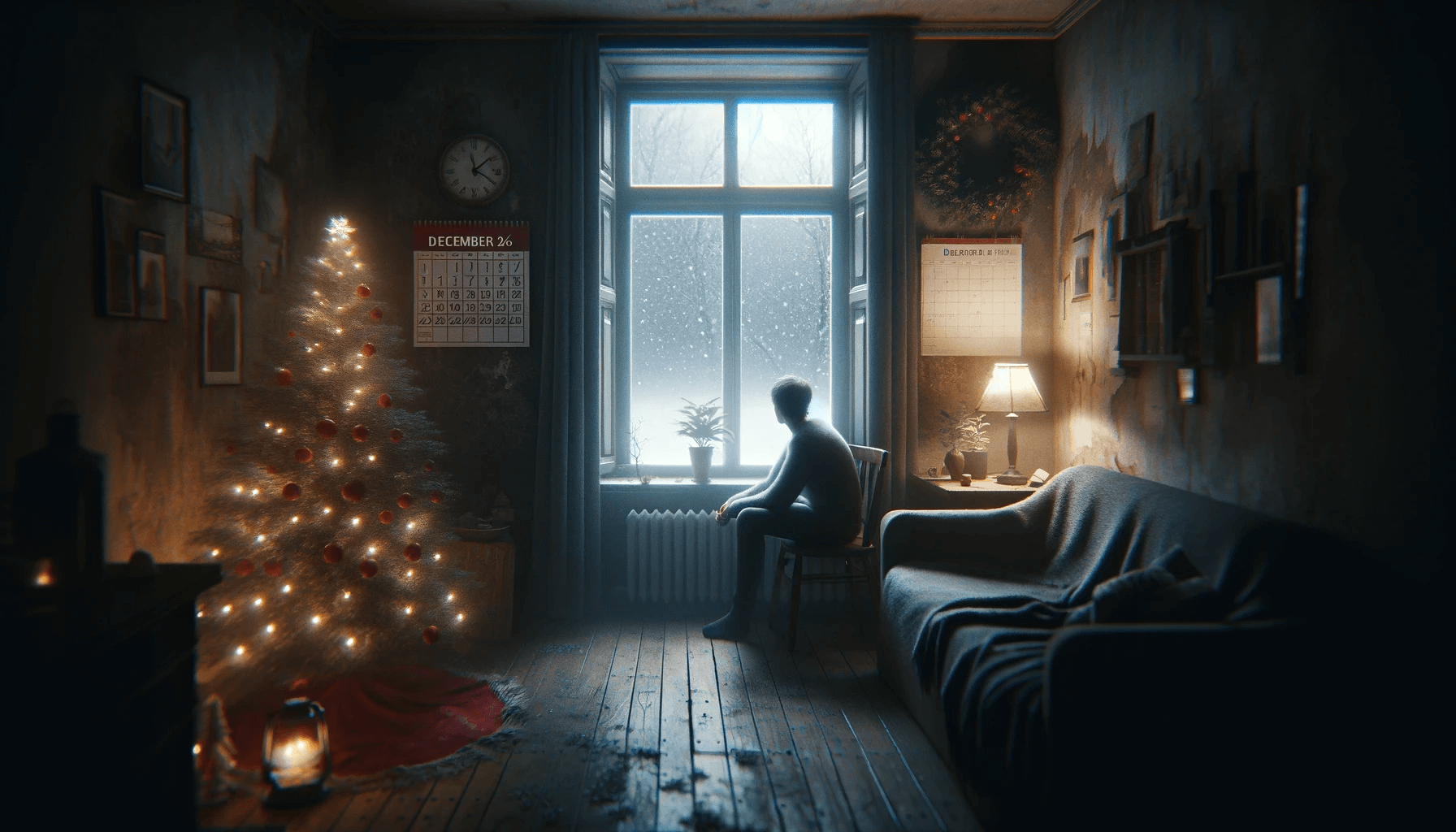Understanding and Overcoming Holiday Blues: A Guide to Managing Post-Holiday and Christmas Depression
It is common for many people to find themselves caught in a web of emotions of holiday blues, post-holiday blues, and Christmas depression with the onset of the festive season. Many people may experience feelings of sadness, stress, anxiety, or depression during the holiday season despite its association with joy and celebration. These feelings are influenced by many factors, such as societal pressures, financial constraints, emotional challenges, and social isolation, all of which contribute to a complex emotional perspective that warrants careful consideration. This comprehensive post will explore the concepts, definitions, differences, signs and symptoms, causes and triggers, diagnosis, and coping strategies for addressing and overcoming these challenges.
Just the blues or something more?
The holiday season, usually linked with delight and festivities, might trigger what’s commonly known as the “holiday blues” for some people. Festive lights and decorations fill the streets with a joyful atmosphere, but some individuals still experience holiday blues despite these cheerful surroundings. Despite the festive atmosphere, various factors can lead to different emotions. This circumstance is a unique and personalised experience that may not align with the usual feelings of holiday cheer.
What are are Blues after holiday season?
Holiday blues are brief feelings of sadness, stress, disappointment, loneliness, anxiety, or other negative emotions that some people may experience during the holidays. Factors like high or unrealistic expectations, family dynamics, financial pressure, and social isolation can contribute. While many anticipate jubilation and togetherness, some may feel a bit down. These feelings are usually temporary and often go away on their own. If persistent, it’s gainful to seek support. Taking care of yourself, having realistic expectations, and connecting with others may help beat the holiday blues.
Holiday Blues vs. Seasonal Affective Disorder (SAD)
Holiday blues and Seasonal Affective Disorder (SAD) are different emotional challenges often experienced in winter months. Holiday season blues involve temporary sadness, anxiety, or stress during the holiday season, often beginning around November or December. SAD, on the other hand, is a form of depression linked to limited daylight in specific seasons, usually winter. While holiday blues typically resolve shortly after New Year’s, SAD can start in late fall, such as November, and last through early summer, making it longer and more severe. SAD is characterised by persistent sadness, lethargy, and a lack of interest in activities. People with SAD experience symptoms of depression throughout autumn and winter, while those dealing with holiday blues have less severe symptoms. Holiday blues are related to specific events, whereas SAD is a recurring clinical condition requiring medical attention for proper management.
Holiday Blues Signs & Symptoms
Holiday blues can impact everyone, especially those with mental health issues, those who’ve faced loss or trauma, and those prone to stress. The main sign is persistent sadness during the holidays, with varying intensity. Signs may include periodic low moods and brief, upbeat moments. Some other symptoms of holiday depression might consist of:
-
Loneliness
-
Overwhelming stress
-
Frustration
-
Changes in appetite or weight
-
Irregular sleep patterns
-
Irritable mood
-
Difficulty concentrating
-
Fatigue
-
Tense, worried, or anxious
-
Feelings of worthlessness or guilt
-
Loss of interest in doing things you used to enjoy
If you notice more persistent symptoms lasting more than two weeks, it may indicate a more serious condition and you should consider seeking professional help.
Causes & Triggers
Holiday seasons can be difficult times for many people. As the holidays near, they bring joy and the holiday season blues – a mix of emotional challenges that can dampen the festive spirit. Amidst the lights and carols, many face this nuanced experience, so understanding the causes and triggers of holiday blues can help manage them effectively.
Causes
-
Stress from holiday demands: finances, gift shopping, hosting
-
Pressure to spend and the stress of trying to afford gifts, which can increase financial burden and contribute to holiday blues
-
Unrealistic expectations
-
Loneliness emphasised during family-focused holidays
-
Pressure for perfect celebrations
-
Contrast between the festive atmosphere and personal struggles
-
Seasonal shift with shorter days and colder weather
Triggers
-
Family conflicts
-
Loss of a loved one
-
Reminders of past traumas
-
Recent loss or life change
-
Loneliness and isolation
-
Comparison and inadequacy
-
Negative past experiences
-
Pressure to meet expectations
-
Tension and stress in family gatherings
Diagnosis
Diagnosing holiday blues involves identifying persistent negative feelings during the holiday season, often through self-reported symptoms. Only a healthcare professional can determine if someone should be diagnosed with a mental health condition, and this diagnosis often involves answering specific questions about your symptoms, their duration, and severity. Though not officially classified in the Diagnostic and Statistical Manual of Mental Disorders (DSM-5), it’s essential to consult a professional for an accurate diagnosis, ensuring a thorough assessment to differentiate holiday blues from more serious mental health issues. During the appointment, your doctor will ask about your symptoms to assess their nature and severity. Discussing symptoms is vital for an accurate diagnosis and ensuring appropriate care, especially when conditions like hypothyroidism can mimic depression symptoms.
How to overcome negative feelings with care for your mental health?
The first step to overcoming holiday blues is beating the blues. Beating the holiday blues means caring for yourself and staying connected to find joy. Combating the holiday blues involves treatment & management and coping strategies.
Remember, taking small but intentional steps can make a big difference in gradually overcoming holiday blues.
Treatment & Management
To overcome the holiday blues, practice the following:
-
Set realistic expectations
-
Prioritise yourself
-
Manage stress
-
Maintain routines
-
Seek support from loved ones or professionals
-
Engage in joyful activities and social events
-
Practice mindfulness to notice symptoms
-
Express gratitude for a more positive holiday experience
-
Implement these strategies to lower stress and improve overall well-being during the holiday season
Coping Strategies
Here are some coping strategies if you’re feeling down or stressed because of the holiday blues. These strategies can also help relieve stress:
-
Set Realistic Expectations
-
Prioritise self-care & stay positive
-
Share your feelings with friends or family
-
Set boundaries – learn to say ‘No’
-
Focus on the positive
-
Get plenty of sleep & exercise regularly
-
Avoid self-isolation
-
Face negative feelings in a healthy way
-
Try eliminating negative emotions
-
Watch what you are eating; drink only in moderation
-
Be open to new traditions
-
Don’t overcommit or overindulge; follow a schedule
Don’t Let the Holiday Blues Overwhelm You
If you’re feeling overwhelmed or down during this holiday season, remember it’s okay to seek professional help.
Post-Holiday Blues

After the holidays end, some people might feel a bit sad and lonely. The excitement of the celebration is over, and it can leave a sense of disappointment, like missing something fun or emotional withdrawal from the holiday mood. Many people look forward to the holidays, so when the season ends, the post-holiday blues can feel even more pronounced.
What is Post-Holiday Blues?
Post-holiday blues refers to the short-term feelings of sadness and letdown that some people experience immediately after the holiday season concludes. A sense of emptiness, disappointment, or a longing for the joy and excitement of the holidays marks the post-holiday blues. Some individuals suffer from post-holiday blues just with the dreaded thought of the upcoming winter months following the holiday season. However, it’s perfectly normal to feel a dip in mood after the heightened excitement of the joy and celebration.
Re-establishing structure in your daily routine can help ease the transition and support your well-being after the holidays.
Differences from General Holiday Blues
General holiday blues and post-holiday blues are both types of depression or sadness that can occur during or after the holiday season. General holiday blues happen when you feel sad or stressed during the holiday. It could be because of financial issues, family conflicts, or the pressure to make everything on the holiday perfect. Meanwhile, post-holiday blues arise after the holidays are over. It can be because you feel sad as you’re back to your normal routine, lack socialisation or excitement, or feel disappointed due to unmet expectations or the lack thereof.
Signs & Symptoms
Post-holiday blues usually occur when individuals return to their routines and responsibilities after a festive holiday season. For some, the symptoms of post-holiday blues may feel stronger due to factors like loneliness or emotional exhaustion. The signs and symptoms of post holiday blues are transient and tend to improve over time. If the feelings are persistent or become more severe, it’s time that you seek support from friends, family, or a mental health professional. Signs and symptoms of post-vacation blues may include:
-
Fatigue
-
Mood changes (sadness, irritability, or sadness/emptiness)
-
Difficulty concentrating
-
Lack of motivation
-
Disturbed sleep patterns
-
Stress and anxiety
-
Changes in appetite
-
Social withdrawal
-
Nostalgia
-
Low energy/Lethargy
Causes & Triggers
Many people experience a common phenomenon after returning to their daily routine from a holiday. This phenomenon is known as the post-holiday blues. While the causes of post-holiday blues can vary from person to person and can be internal, there are also external triggers that contribute to this feeling. Some common causes and triggers of post holiday blues include:
Causes
-
End of social gatherings and festivities
-
Disruption of daily routine
-
Feeling overwhelmed by responsibilities
-
Financial strain due to holiday expenses
-
Unrealistic expectations for the holiday
-
Comparison of everyday life with the holiday experience
-
Lack of time for hobbies or neglecting hobbies that bring enjoyment and relaxation
Triggers
-
Returning to work or school
-
Seeing others’ holiday pictures and hearing about their experience
-
Feeling distant from family and friends
-
Assuming the holiday was too short or not relaxing
-
Feelings of unmet expectations
-
Remembering stressors forgotten during the holiday
-
Readjustment to a regular sleep schedule
-
Difficulty re-engaging in hobbies that help reduce stress and improve well-being
Diagnosis
Diagnosing post-holiday blues involves identifying signs of depression, like fatigue, irritability, and a sense of general malaise after a holiday season. In some cases, post-holiday blues may require professional evaluation to rule out more serious conditions. Challenges with concentration may also be present. Seeking guidance from a healthcare professional is critical for an accurate diagnosis. In determining whether it is post holiday blues or a more severe condition like depression, clinicians consider the duration, intensity, and impact on daily life. A comprehensive evaluation involves exploring aspects such as lifestyle, stressors, and coping strategies to understand an individual’s mental well-being better.
How to overcome post holiday blues?
The holiday season brings joy and quality time with loved ones but can also lead to post-holiday blues when the routine resumes. As you move forward, decide what routines and boundaries work best for you to support your well-being. You can successfully confront this transitional phase with effective treatment, management, and coping strategies.
Set realistic expectations of Treatment & Management
To overcome post-holiday blues:
-
Start by acknowledging and accepting your emotions.
-
Set realistic expectations for the transition period and create a post-holiday routine that brings joy and purpose.
-
Stay active through exercise and prioritise self-care to lift your mood and rejuvenate yourself.
-
Focus on overall wellness by incorporating routines that support both your mental and physical health, helping you maintain a balanced lifestyle during the post-holiday period.
Coping Strategies
Here are some coping strategies if you’ve been down or stressed with post-holiday blues:
-
Give yourself time
-
Gradual transition – ease back into routine; don’t rush!
-
Connect with loved ones
-
Set boundaries – learn to say ‘No’
-
Exercise or get in some physical activity
-
Socialise more often
-
Get enough sleep
-
Eat a balanced and nutritious diet
-
Avoid alcohol and drugs
-
Try something new
-
Find Ways to Deal With Stress
-
Cultivate a positive mindset by practicing gratitude, reframing your perspective, and focusing on optimism
Don’t Let the Post-Holiday Blues Overwhelm You
If you’re feeling overwhelmed or down during this holiday season, remember it’s okay to seek help.
Christmas Depression

For many, Christmas is a time of joy, jubilation, and togetherness. They consider it the most wonderful time of the entire year. However, this festive season can be incredibly difficult for individuals, bringing about sadness and despair. More to that, Christmas may not feel as joyful for some people dealing with depression or any mental distress. This phenomenon, known as Christmas depression, can have a notable impact on mental well-being during this time of the year. While Christmas depression is not a clinical diagnosis, it can worsen symptoms for those with pre-existing mental illness.
What is Christmas Depression?
Christmas depression, also referred to as holiday depression, is a severe form of depression that specifically occurs during the Christmas season. It is similar to Seasonal Affective Disorder (SAD) in that it involves persistent feelings of sadness, low mood, and decreased energy levels. However, while SAD is a clinical depression condition characterised by depressive symptoms, Christmas depression is a non-clinical term. Major depression or Persistent depression, on the other hand, are clinical diagnosis that requires medical evaluation and treatment, distinguishing it from temporary or situational feelings like Christmas depression.
Differences from General Holiday Blues
Christmas depression and general holiday blues, while both festive season emotional challenges, differ in nature. General holiday blues are short-term stress and sadness arising from unrealistic expectations like gift shopping or family members gatherings, manageable with self-care. On the other hand, Christmas depression is a more profound and enduring condition tied to factors like social isolation and financial strains, requiring professional intervention such as therapy or psychiatric support. Self-blame over unmet expectations or perceived failures can also intensify Christmas depression, especially during moments of personal reflection at the end of the year. The significant difference in intensity and duration underscores the need for additional support in addressing Christmas depression compared to the less intense and short-lived general holiday blues.
Signs & Symptoms
A common phenomenon that affects many individuals during the festive season is what we know as Christmas depression. Like post-holiday blues, it occurs when people struggle to adjust to their regular routines and responsibilities after the joyful celebrations. The signs and symptoms of Christmas depression are often temporary and tend to improve over time. However, if the feelings persist or deteriorate, it is wise to seek support from loved ones or a mental health professional. Some common signs and symptoms of Christmas depression include:
-
Intense sadness
-
Feelings of loneliness
-
Increased stress
-
Loss of appetite
-
Sleep disturbances
-
Feelings of guilt or worthlessness
-
Difficulty concentrating
-
Thoughts of self-harm or suicide
-
Loss of interest in activities
-
Face to face interactions avoidance
Causes & Triggers
After the conclusion of the festive season, individuals may experience Christmas depression, marked by a lingering sense of sadness. This emotional downturn results from internal factors like unmet expectations and inability to manage loneliness, alongside external pressures such as financial stress. Recognising the triggers is essential for handling and reducing the impact of Christmas depression. Some common causes and triggers of Christmas depression include:
-
Causes
-
Financial stress
-
Social isolation
-
Unmet expectations
-
Family conflicts
-
Unresolved grief or loss
-
Pressure to participate
-
Seasonal Affective Disorder (SAD)
-
Traumatic memories
Diagnosis
Diagnosing Christmas depression involves identifying symptoms such as persistent low mood, disinterest in festivities, and intense loneliness. Certain symptoms and strategies have been shown to help differentiate between temporary blues and deeper depression. Consulting a mental health professional is necessary for assessment and intervention, with treatment options including therapy , medication, or a combination. Self-care strategies like relaxation techniques and seeking support may also be beneficial. Differentiating between temporary blues and deeper depression considers symptom duration, severity, and impact on daily life, guiding the creation of personalised treatment plans based on factors like social support and mental health history.
How to overcome Christmas depression?
Christmas depression is a common occurrence. Overcoming Christmas depression involves promoting a supportive environment and practising self-care. Keeping realistic expectations and maintaining self-care routines during the Christmas season is essential for managing stress and emotional well-being. It requires a comprehensive approach and critical coping strategies tailored to individual needs.
Treatment & Management
-
Overcoming Christmas depression may include the following:
-
Professional help – individual counselling or therapy
-
Therapy – CBT is highly beneficial
-
Medication – antidepressant medications help manage symptoms
Coping Strategies
Here are some coping strategies if you’ve been combating Christmas depression. Good examples include joining a support group or practicing mindfulness:
-
Self-care – get enough sleep, eat well, engage in relaxation techniques
-
Setting boundaries – learn to say no to excessive demands
-
Seek support – lean on family and friends, or support groups
-
Stress-reducing activities – meditation or yoga
-
Establish a routine – to maintain stability
-
Create new traditions – to better suit your emotional well-being
Don’t Let the Christmas Depression Overwhelm You
If Christmas depression feel overwhelming or you struggling with this condition, it’s important to know that help is available.
Supporting Others
During the holiday season, be mindful of those dealing with holiday blues, post-holiday blues, or Christmas depression. Show empathy, lend an ear, and reach out to a close friend for a judgment-free conversation. When supporting others, remember the value of being a good listener—attentively listening can help individuals feel truly understood during challenging times. Consider organising small gatherings or virtual events focused on shared activities to create positive experiences and distract from negative emotions. Support during the holiday season involves encouraging self-care. Remind others to prioritise activities that promote well-being, like taking breaks, getting enough rest, and engaging in joyful and relaxing pursuits. Emphasise the importance of setting boundaries and saying no to excessive commitments. If needed, suggest seeking professional help for comprehensive support. Understanding their struggles and providing companionship can promote a sense of care and connection. Maintaining healthy relationships can help buffer against holiday blues and support overall wellbeing. Creating a mental health-focused environment contributes to a more supportive and compassionate holiday season.
Role of Therapy and Counselling
During holidays, individuals may feel extra stressed, lonely, or deal with high expectations, making them emotionally upset. Therapists can assist by giving tips, changing how they see things, and teaching skills to handle stress and build inner strength. Therapy and counselling play an indispensable role in addressing holiday blues, post-holiday blues, and Christmas depression. They offer a supportive environment, coping strategies like CBT and mindfulness, and help explore underlying issues. Counsellors aid in processing emotions, setting realistic expectations, and establishing healthy routines, contributing to mental well-being during and after the holidays. Therapy provides individuals with tools to manage emotions, such as learning to track one’s negative thoughts and feelings, which promotes self-awareness and better understanding of mental health, ultimately supporting perseverance and better handling holiday challenges.
Contact Psychology Blossom
If the holiday season brings about feelings of sadness, loneliness, stress, or anxiety, Psychology Blossom, a leading professional Counselling Centre in Singapore, can help you. Our experienced therapists provide expert guidance and tailored support for holiday blues, post-holiday blues, or Christmas depression. We offer a compassionate space to work on challenges like festive pressure, family dynamics, and personal issues, promoting healing and well-being. Feel free to reach out for support if you or someone you know is experiencing challenges this holiday season. Psychology Blossom is committed to aiding individuals in rediscovering joy and tranquillity during the festive period. We aim to ensure everyone receives support to overcome the holiday season blues. Contact us today for personalised assistance and embark on the initial journey toward a healthier and more joyful holiday season. You are also encouraged to visit our centre or website for more information or to schedule an appointment.
Conclusion
Taking care of the complexities of the holiday season requires awareness of emotional challenges such as holiday blues, post-holiday blues, and Christmas depression. Individuals can work towards passionate persistence by recognising the signs and understanding the underlying causes. This understanding enables the implementation of effective strategies to minimise the impact of these challenges and maintain well-being during the festive season.
It is important to seek reliable information about mental health and holiday blues to make informed decisions and access appropriate support.
Ultimately, prioritising mental health and intentionally creating a holiday experience that is both joyful and emotionally fulfilling is key. Doing so can transform the holiday season into a genuine celebration and connection.
Struggling with Holiday Blues or Christmas Depression?
Our team of experienced therapists and counsellors is here to help. Contact us today to schedule your personal consultation and begin your journey towards healing and happiness.
FAQs
Why do I get sad at the end of a holiday and past holidays?
For various reasons, feeling sad at the end of a holiday is common. It could be the emotional investment in spending time with loved ones, the transition from a festive, joyful atmosphere to routine and responsibilities, unmet expectations, or the loss of freedom experienced during the holiday. Additionally, reflecting on the past year and its experiences can also contribute and worsen feelings, as people often assess achievements and emotional states during this time.
Why do I feel weird after a holiday?
Feeling weird after a holiday is quite common among individuals. It involves adjusting to routine activities after a holiday break. The sudden shift from a holiday mood to a routine may cause disorientation or unease. Sometimes, returning to the same routines can feel like being stuck in a loop, repeating the same patterns after the festivities end. In addition, expectations for a perfect holiday can lead to disappointment when reality doesn’t match. Other reasons contributing to feeling weird after a holiday are lack of restorative sleep, travel fatigue, and changes in diet.
Is it normal to cry after a holiday?
Yes, it is normal to cry or experience sadness or nostalgia after a holiday. The build-up of excitement and anticipation leading up to the holiday can make it difficult to transition back to the routine of everyday life. Sometimes, the pressure to have a picture-perfect holiday can lead to disappointment when reality doesn’t match expectations, resulting in an emotional release afterward. Crying can be a way to release emotions and process the transition. It is essential to give yourself time to adjust, seek support, and practice self-care during this period.
What are the symptoms of holiday anxiety?
Symptoms of holiday anxiety include increased stress, feeling overwhelmed or irritable, difficulty sleeping or concentrating, changes in appetite, and a sense of restlessness. Physical symptoms like headaches or digestive issues may also occur. It’s important to seek professional help if symptoms persist.
What is holiday burnout?
Holiday burnout refers to the exhaustion and stress experienced by individuals during or after the holiday season. Typically, it results from excessive holiday-related activities, financial pressures, social obligations, and the high expectations associated with the festivities.
What is a blue mood?
Blue mood refers to a short-term state of sadness or a feeling of emotional downcast. We use this term to describe a sense of sorrow or low spirits common during and after the holiday season. Blue mood is often associated with feelings of low energy and motivation.
Why do I feel lazy after a holiday?
Individuals often feel lazy after a holiday because of the shift in routine, relaxation during the holiday, and a reluctance to resume daily activities. The holiday break may disrupt regular habits, making it challenging to re-engage with everyday tasks immediately. It may take some time to readjust to normal routines and regain motivation.
Why is sadness called the blues?
The term blues is a colloquial expression used to convey emotions of sadness. It is metaphorically associated with blue, commonly correlated with a dark or miserable mood. The word originated from the African-American music culture, where ‘blue notes’ conveyed emotions such as sadness or low-spiritedness.
Why do we feel depressed after the holidays?
Individuals experience post-holiday depression due to factors such as social withdrawal at the end of festive activities, the return to routine, unresolved stress or grief triggered during the holidays, and unrealistic expectations. The contradiction between the joyful holiday and the everyday reality can contribute to feelings of sadness and emptiness.
For more information on post-holiday depression, consider consulting reputable sources and research studies to better understand its causes and effective coping strategies.
How long does post-holiday depression last?
For most individuals, post-holiday depression typically lasts a few days to a few weeks. However, the duration can vary for each person depending on individual circumstances. Engaging in self-care, maintaining social connections, seeking support, and implementing resourceful coping strategies can help reduce symptoms and speed up recovery.
We recommend This Video to those who wants to learn more about Holiday Blues.











